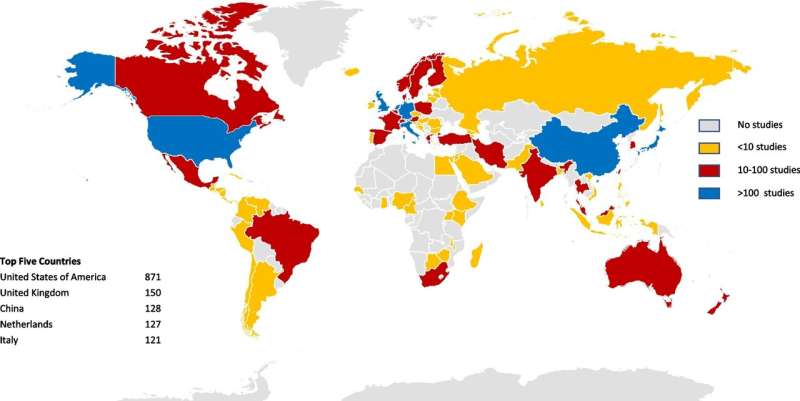This article has been reviewed according to Science X's editorial process and policies. Editors have highlighted the following attributes while ensuring the content's credibility:
fact-checked
peer-reviewed publication
trusted source
proofread
New research can help policymakers prioritize cancer funding needs and allocate resource

Results from the largest ever review of clinical trials in cancer screening, prevention, and early detection (SPED) have been published.
The review, published in BMC Cancer, found that 61% of all SPED trials focused on just three cancer types—colorectal, breast, and cervical cancer. This compares with 6.4% in lung cancer and 1.8% in liver cancer, which are responsible for 26.3% of global cancer deaths compared with 19.3% for colorectal, breast, and cervical cancer.
Researchers identified areas of unmet needs around the world to highlight where more research and funding is needed. A total of 88% of all SPED trials were conducted in North America, Europe, or Asia, with a lack of trials conducted in Africa and South America and a very low number of trials per head of population In Asia.
Results also highlighted that significant disparities exist between the proportion of SPED trials for certain cancer types and their global burden of disease. For example, colorectal cancer accounted for 32.9% of all SPED trials and 9.4% of global cancer deaths, while gastric cancers accounted for 1.5% of SPED trials and 7.7% of global cancer deaths.
This study, led by researchers at the universities of Nottingham and Manchester, involved researchers from seven different universities across England and Scotland.
Dr. Emma O'Dowd, Consultant Respiratory Physician and Associate Professor at the University of Nottingham, says, "Cancer is the most common cause of death and disability in the UK and the second most common cause globally. Global annual cancer incidence is forecast to rise to 27.5 million by 2040, a 62% increase from 2018. For most cancers, prevention and early detection are the most effective ways of reducing mortality.
"We looked at all trials published between 2007 and 2020 covering cancer screening, prevention, and early diagnosis to map what research had been done by cancer type, trial focus and geographical area, and to highlight research gaps.
"Over 117,000 papers were identified, and 2,888 trials were included. There were disparities in terms of geographical location, type of research conducted and a clear focus on a small number of cancer types. We hope that this important piece of work can be used to guide and prioritize future trial funding."
Dr. Elizabeth Roundhill, Research Fellow in the School of Medicine, University of Leeds, comments, "Our research has revealed that even though lung and liver cancers together cause more than a quarter of cancer deaths worldwide, they are less likely to be examined in screening, prevention and early diagnosis (SPED) trials. We also found there was a distinct lack of trials in cancers common in children and young people including sarcomas, blood cancers and brain tumors.
"Importantly, only 12% of SPED cancer trials have taken place in the Global South, meaning that the benefits of implementing SPED interventions in some of the world's most populous regions remain unknown.
"With almost half of all cancers in the UK having a potentially preventable cause, this work calls for a greater focus on SPED research, including in the UK. We hope that these findings will encourage funders, policy makers and researchers to target resources towards addressing these major health inequalities in the future."
More information: Emma L. O'Dowd et al, Clinical trials in cancer screening, prevention and early diagnosis (SPED): a systematic mapping review, BMC Cancer (2023). DOI: 10.1186/s12885-023-11300-8


















